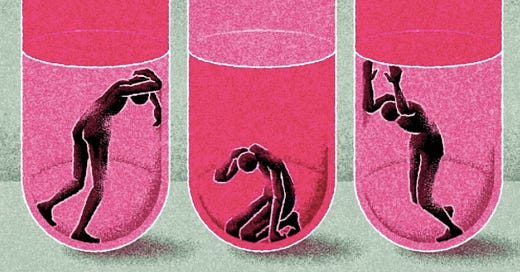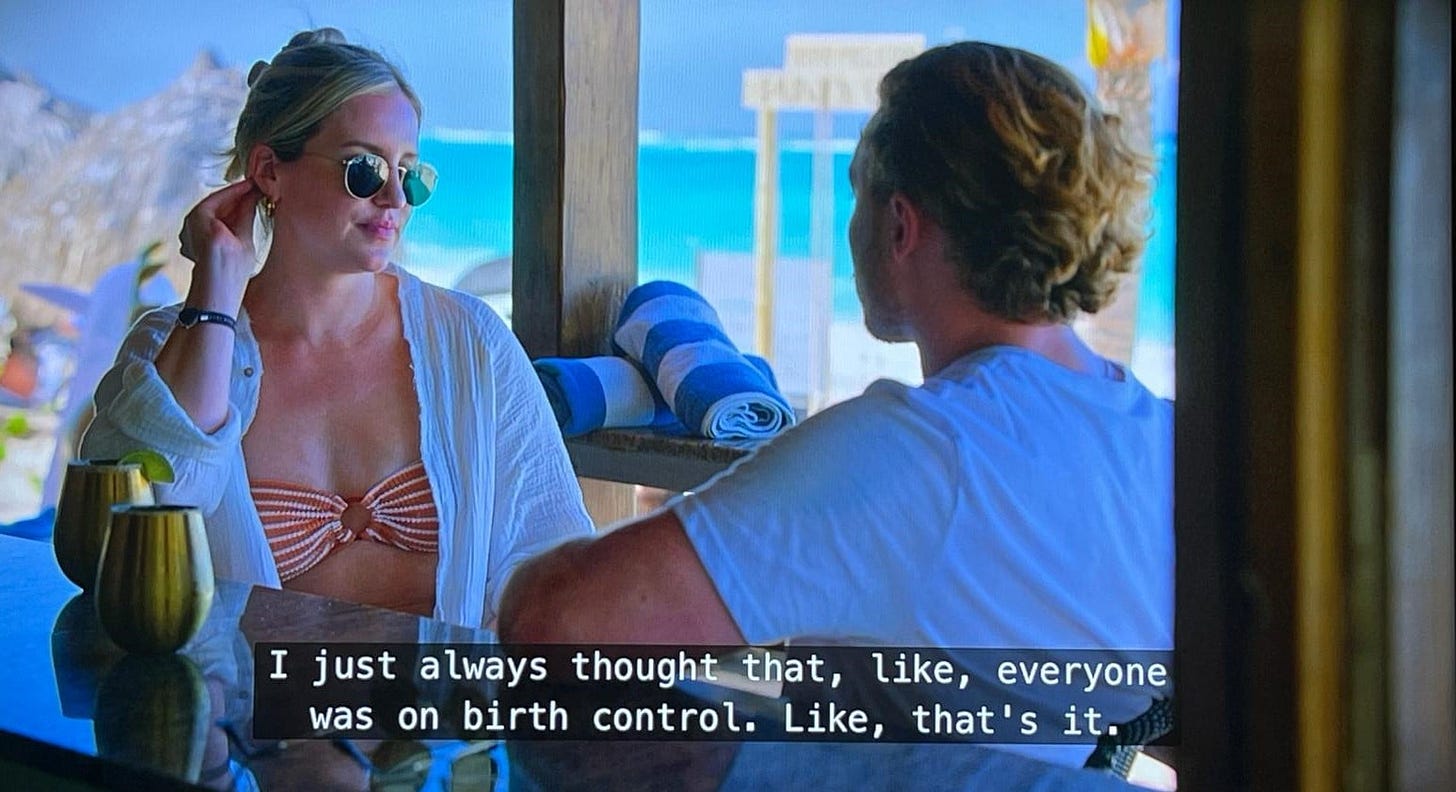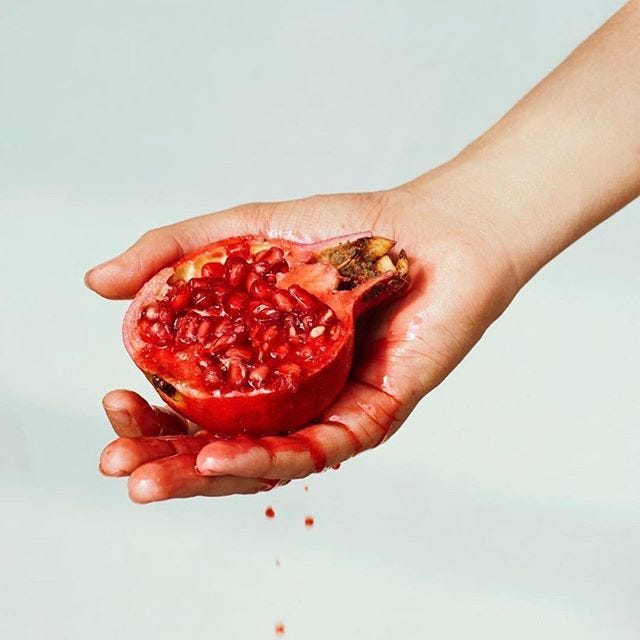we need to talk about hormonal birth control
on listening to your body, and the history of pain that is women's health
When I first learned what an IUD was, I thought it was too good to be true. I was eighteen and astonished at the fact that copper could be 99.2% effective in preventing pregnancy. With my limited knowledge of birth control, I determined that this was my future.
Years later, in a public health class on family planning, I learned that IUDs topped the list of most effective birth control methods, alongside implants (too dystopian), sterilization (out of question), and abstinence (defeats the point). I doubled down on the IUD, convinced that this little piece of plastic was the right choice for me. But all these convictions were largely hypothetical until I got engaged last year.
When push came to shove, I decided to go for a hormonal IUD rather than a copper one. Whereas copper acts as a natural spermicide, the hormonal option effectively administers the pill to your uterus. I chose Mirena, the flagship hormonal IUD brand, for two reasons: (a) I learned that it was 99.8% effective (much more compelling than 99.2%), and (b) my best friend had Mirena and loved it.
So, with the guarantee of no unwanted pregnancies and a bit of self-inflicted peer pressure, I scheduled my insertion appointment. I’ll spare you the details of how an IUD insertion goes down, but if you’re thinking about getting one I highly recommend watching an animated step-by-step video of the procedure beforehand.
One side effect of Mirena I wasn’t too keen on, however, was that I would eventually lose my period. I could do without the deliberating cramps, but the idea that I would cease to bleed once a month, after having done so for over a decade, felt strange. But that was the least of my worries. After getting the IUD, my body started changing in small but noticeable ways.
One week in, I was so bloated I put on a kilo. Though I was used to menstrual cycle related bloating, this was something else. After Googling “Mirena weight gain,” I learned that it was normal for some women do put on a few pounds. Great, I guess I’m one of them. A month in, and I experienced migraines unlike anything before; migraines that could only be cured with the maximum dose of painkillers and all the lights off. Another Google search reveals that some women report experiencing migraines post-IUD. This becomes a monthly occurrence.
hormonal birth control in the media
During this time, I noticed that the topic of hormonal contraception seemed to be coming up a lot online. For instance, one of the male contestants on Love Is Blind Season 6 received backlash for trying to pressure his partner into getting on birth control, despite her being hesitant about its side effects. Again, on Love Is Blind Season 7, a couple got into a disagreement over one partner refusing to go on birth control and the other refusing to wear condoms.
In both seasons, though the men were adamant about not getting pregnant, they placed the burden of contraception squarely on the women. As upsetting as this was, I appreciated the women in these conversations for sharing their side. They reminded me that hormonal birth control wasn’t a joke, and that I shouldn’t have to normalize what was happening to me, especially when I had other options.
Still, I put up with my newfound symptoms for months. I got very disciplined about diet and exercise for a while, and managed to bring my weight under control. Each passing month my period got lighter. I though my body was adjusting until around two months ago when I began noticing symptoms I could no longer ignore. No matter how much fiber I consumed, I was always bloated. I had a feeling I was losing hair, too; not only on my head, but my eyebrows as well.
The worse symptom of all I didn’t realize until I started rewatching The Vampire Diaries. In TVD, vampires have the ability to turn their humanity off, making them emotionally numb and consequently ruthless. Once a vampire shuts off their humanity, it’s difficult to get them to turn it back on, as they’ll have to face every bad decision they made during that time (i.e., going on a killing spree).
This got me thinking about how the IUD had changed me emotionally in the last few months. I realized that I no longer felt desire like I used to; instead, I felt like a shell of myself, like a woman without her womanhood. Maybe it’s ok if I’m not driven by desire anymore, I told myself. But watching TVD reminded me that the longer I put off feeling what I was supposed to feel, the worse it was going to be when I eventually took the IUD out and it all came rushing back.
One day, you will flip that switch back on, and all the bad stuff that you did is gonna come rushing back, and it is going to suck.
—Damon Salvatore, The Vampire Diaries
taking anecdotal evidence more seriously
One of the most important factors in my decision to remove my IUD was the the subreddit. On the sub, there’s a thread where over two hundred women have posted about their negative experiences with Mirena, and how much better they felt after taking it out. I probably read most, if not all, of this thread prior to making my decision. In addition to the ones I’ve mentioned, common side effects included heightened anxiety, fatigue, and palpitations. A lot of women wrote about feeling better immediately after removal, some saying it took about a year to feel completely back to normal. It made me sad, however, knowing how long some of these women endured these symptoms before getting help.
Since Mirena lasts up to five years, many of the women on the sub did not get their IUD removed until they had to. It was one of the reasons why I was holding back from getting mine out. All the medical advice I read encouraged me to wait out the symptoms, urging me that it would get better. In some ways, I felt like a quitter, wanting to take my IUD out before I even hit the one year mark. Reading these women’s stories, however, gave me the confidence I needed to reclaim this part of my life. They reminded me not to ignore my gut feeling. In the end, there was no medical reason to remove my IUD other than the fact that I wanted it out.
The history of women’s health mirrors the history of pain. From an early age, we are taught to normalize the pain of being a woman. From menstruation to menopause, and all the phases in between—birth control, fertility treatments, child birth—the eras of our lives marked with physical and emotional turbulence.
I think about The Retrievals, a podcast about an egg retrieval clinic where women unknowingly underwent the procedure without anesthesia. When patients vocalized the excruciating pain they experienced mid-procedure, they were largely dismissed. It was later discovered that a nurse at the clinic was stealing the morphine out of the bags used in these procedures and filling them up with saline water instead. I find this story emblematic of the pain women are expected to endure. That we can be gaslighted into believing our experiences aren’t valid, even though we’re the ones who know our bodies best.
get it out NOW
Eight months into Mirena, I was still having a period. Though it was extremely light, it was accompanied by a relentless cramp. Something’s wrong. These weren’t the kinds of cramps I was used to. They were quiet yet persistent, less an alarm and more a warning. I have to admit it to myself, I thought. My body is rejecting the IUD.
After admitting that I wanted the IUD out, I had to figure out whether it could be taken out. The National Health System in the UK is notorious for its wait times, especially when it comes to gynecological procedures. Luckily, IUD removals fell under the NHS’s contraception services, which are much easier to access. I made an appointment on a Wednesday for the following Monday. I was excited, but also nervous that for some reason the clinic wouldn’t be able to help me.
I arrived at the clinic on Monday morning, relieved to find no rush. I waited as the nurse practitioner finished up with the patient ahead of me, before calling me into her room. She asked me my name and checked my appointment details. “I see you’re here for an IUD. Oh, wait, you’re here to have it removed. Why?” She was surprised at first, but sympathetic once I told her my reasons. I sighed in relief once she confirmed that they could go ahead with the procedure.
Though the nurse practitioner had to manipulate the IUD’s string a bit, she was eventually able to fish it out. She showed it to me before throwing it away; it couldn’t have been more than two inches long. In my mind, it took up all the space in my uterus. How could something so small reap so much havoc? Walking out of the clinic that day, I felt like a new woman. With a spring in my step and smile on my face, I felt the quiet cramping finally starting to die out.
the aftermath
It’s been a full cycle since I had the IUD taken out, and the transition hasn’t been easy. Week 1 was euphoric, I was at such an emotional and physical high I thought I might feel like that forever. Week 2 I was highly irritable, trying my best to keep it together. Week 3 I was ravenous, constantly hungry but lacking an appetite. Week 4 I was incredibly bloated and emotionally sensitive. Week 5 my period came back as if I’d never had an IUD in the first place—I’d never been happier to see a pad soaked with rubious, pomegranate-colored blood.
I thought the first month would be the hardest, but was happy to endure it thinking it would get better with time. Then came Week 6. Week 6 I realized I was experiencing what’s known as Mirena crash. Simply put, it’s taking my body time to start producing progesterone again. And, given that your progesterone is naturally lower right after your period anyways, Week 6 was rough. The insomnia alone was soul crushing—one that could only be cured with patience and a heavy diet of supplements. I’m on Week 7 now and though it feels like the worst is over, I know have a long way to go before I finally feel like myself again.
On the plus side: I no longer have migraines, and I lose half as much hair in the shower. My eyebrow hairs aren’t falling out anymore. The bloating is finally dying down, too. Emotionally, I’m in The Vampire Diaries phase of dealing with the aftermath of shutting my humanity off. It’s a slow process, but I’m making amends with my body.
I’ve decided to use non-hormonal contraception for now; it’s a more hassle than an IUD, but worth the peace of mind. In hindsight, being on hormonal birth control was a kin to chemical subjugation. I felt like Kristen Stewart in the dystopian film Equals, where people resemble robot workers. As far as I’m concerned, the IUD operated as the establishment intended. It made me a very insular and self-involved person, untethered from love or intimacy; great for getting things done, but unsustainable in the long-run.
That being said, not all women’s experiences with hormonal contraception are negative. Most notably, hormonal birth control helps women who suffer from debilitatingly painful periods, minimizing bleeding and cramps. This is especially true for those who suffer from PCOS and/or endometriosis. Moreover, hormonal contraception gives women the right to their fertility when the law denies it—autonomy that hundreds of millions of women worldwide do not have access to.
All this to say: I am not against hormonal contraception. I just don’t think we should be so laissez-fair about it. Hormonal birth control is no joke and it affects everyone differently. It’s not meant for everyone and it wasn’t meant for me. To the women who feel a net benefit being on hormonal birth control, I am happy for you. But, if you’re like me, and have a feeling that it’s not working for you, please don’t ignore it. Listen to your body above all else. Because in the twenty first century, wellness and contraception should not be mutually exclusive concepts.








Firstly, thank you for speaking on this topic! I took a sexual health class in college and learned about various contraceptives, but sadly, it was an elective and not a required course. Every person - regardless of gender - should take this class!
I remember IUDs being more effective than oral pills and arm implants like Nexplanon. I would've preferred Nexplanon over Mirena because just the idea of a Pap smear makes me nauseous, but I've heard the side effects are similar for both. I know someone right now who told me she had her IUD removed because it resulted in weight gain, headaches, bloating, etc. Basically similar to the symptoms you told me. I do think birth control, as you said, is a good option if you have painful periods or acne, but that can also be treated via an oral contraceptive. As someone who has suffered with adult acne, sometimes you're willing to do anything to get rid of it without thinking of the consequences.
I know this must have been a difficult topic to write on. Thank you for sharing your experience and helping anyone who is considering getting an IUD or another form or hormonal birth control!
I'm sorry to hear about your experience with Mirena; it's definitely not for everyone.
Working in healthcare, I've seen how it can be a saving grace for some, but I also understand that it's not for others, and that's okay. I'm glad you were able to have it removed promptly.
I wonder how much fuller the clinic would be if more women listened to what their bodies were trying to tell them 😓.